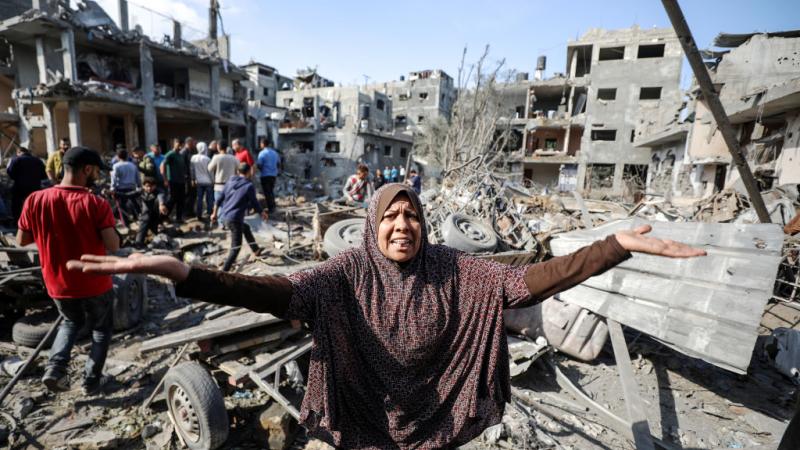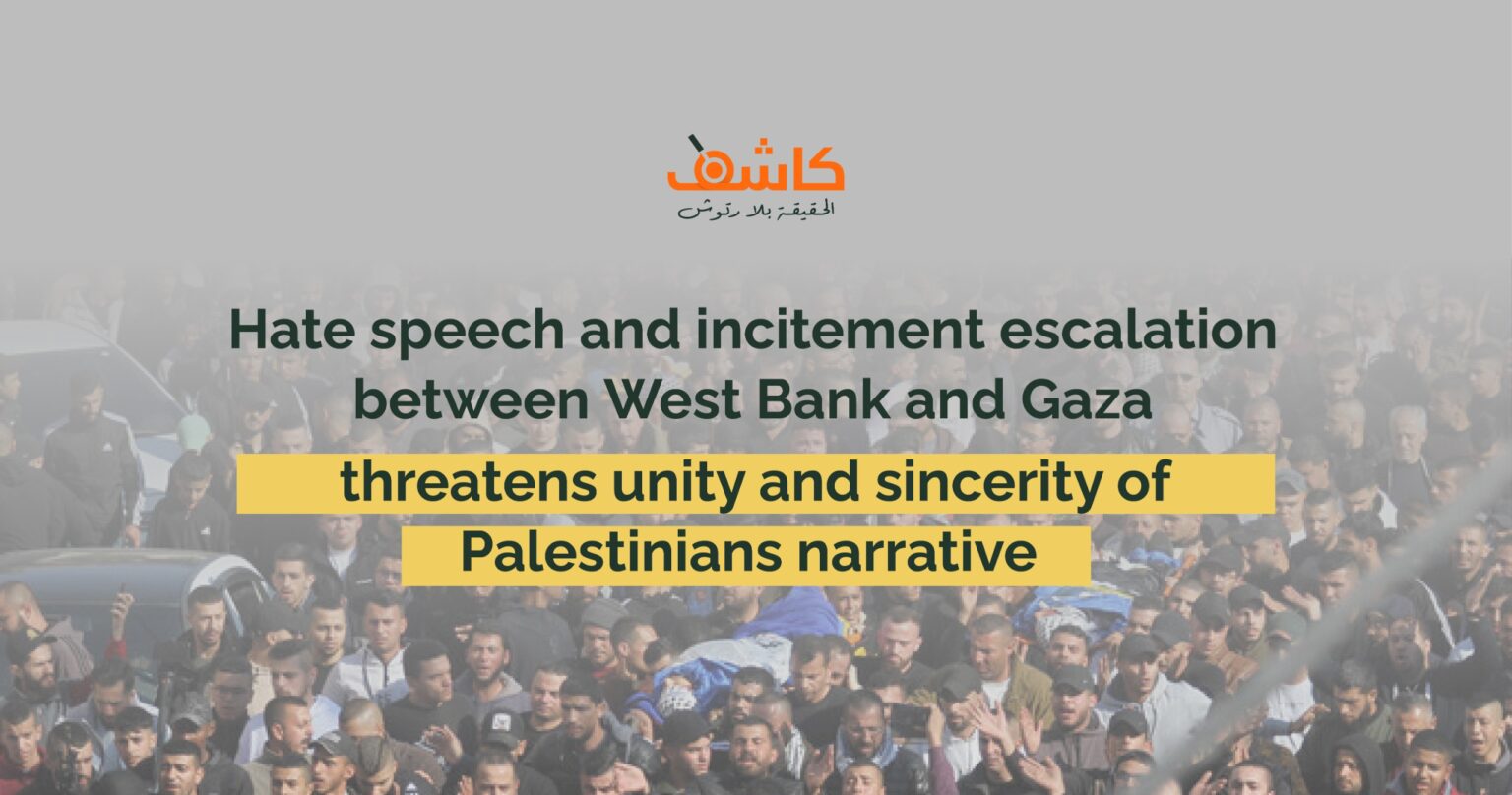Two full years of genocide, destruction, and erasure of every aspect of life in Gaza: around 68,000 martyrs, hundreds of thousands wounded, and an ancient city turned to rubble. Youth grew old before living their lives, children died before they could grow up and fulfill their dreams, and women suffered horrors unlike those experienced by women anywhere else in the world. Poverty has prevailed, and starvation and disease have spread.

On the other side, Palestinians continue to endure daily oppression, starting with repeated raids, checkpoints, and military gates, to targeted attacks by the Israeli occupation soldiers and settler assaults on villages, in addition to racial discrimination and daily crimes in the occupied interior carried out openly and without any real intervention by the occupation police.
As soon as a ceasefire was reached, hate speech visibly escalated on social media. Between those satisfied and dissatisfied with the prisoner-exchange deal, discussions around 7 October 2023 resurfaced in the form of disputes and verbal clashes between supporters and opponents. Hate speech and divisive rhetoric between the West Bank and Gaza became increasingly evident in circulating content. Alarming, too, was that incitement extended to accounts of activists and journalists with large followings, particularly among Palestinians.
This report by Kashif monitors manifestations of hate speech on social media, especially among activists and journalists, examining its causes, consequences, and its impact on solidarity with the Palestinian cause, and explores ways to regulate online content and improve its quality so that it reflects the sacrifices and suffering of Palestinians, forming a united, conscious narrative that limits incitement and hatred within Palestinian society.
Hate Speech on Social Media and Internal Incitement
Kashif spoke with a group of journalists regarding incitement on social media. Journalist Hani Abu Rizq from Gaza explained that addressing this phenomenon requires individual awareness and personal responsibility, along with the role of civil society institutions in organizing seminars, courses, and awareness campaigns to limit the spread of hatred.
Abu Rizq added:
“Journalists bear double responsibility to uphold professional standards and avoid engaging in inflammatory discourse, especially given the urgent need for Palestinian unity in the face of an occupation that constantly seeks to divide society. Users, whether journalists or ordinary citizens, must think carefully before posting or commenting, as a single word can ignite major conflict in a moment of anger. In the end, we are one people, regardless of region or affiliation, and we must preserve our humanity and unity through all this pain.”
Professional Journalism and Ethics
Journalist Ameed Shehadeh, correspondent for Al-Araby TV in the West Bank, agrees, stressing that a core pillar of professional and ethical journalism is avoiding incitement to killing or bloodshed.
He stated:
“A journalist with a mission under occupation must prioritize maintaining societal unity. A professional journalist who adheres to ethics does not fuel internal strife; instead, they strengthen the community and defend the social fabric.”
Shehadeh added:
“Today, the line between real journalism and activism on social media has blurred. Some activists incite violence or target fellow journalists or ordinary citizens, which may ultimately lead to bloodshed. Words used to sow division can pave the way for physical confrontation, whether through violence or weapons. This demands that journalists and activists act responsibly in their speech.”
Journalist Mustafa Qablawi from occupied Palestine emphasized that preventing hate speech is a shared responsibility, not only for journalists but also activists and ordinary citizens. He pointed out that Palestinians have lived through tragic events over the past two years in Gaza, the West Bank, and occupied Palestine, noting that 201 crimes have been recorded in occupied Palestine alone since the beginning of the year.
Blind Partisanship and a Volatile Atmosphere
Journalist Firas Al-Tawil, editor-in-chief of Al-Iqtisadi, pointed out that blind partisanship for any political faction does not exempt individuals from ethical conduct. Resorting to slander, deception, and lies, even in political competition, is a grave error. Some engage in hate-inciting behavior on social media without regard for truth or moral responsibility.
He added that it is troubling to see journalists sharing unverified information or videos solely to attack others, stressing that journalists must uphold the highest standards of professionalism and accuracy and preserve their credibility.
Journalist Reem Abu Labban, who lectures at Khadouri University in Ramallah, believes the solution lies in emphasizing humanitarian language during this sensitive stage. After the war on Gaza stopped, online discussions have become more sensitive, and any analysis may be interpreted as bias.
She says, “It is difficult in this climate to express your opinion without being misunderstood. Journalism today is like walking in a gray zone requiring delicate balance between speaking truth and preserving Palestinian unity, especially as social media turns into an emotional battleground.
Journalist Shorouq Al-Alya from Gaza explained that this discourse stems from real suffering: Gaza’s people are grieving after two devastating years, feeling unheard and abandoned, even by some fellow Palestinians. This emotional trauma fuels anger among Gaza-based journalists and activists. She stressed the need for empathy toward Gaza’s psychological state, as the population is still in shock and understanding their pain will ease tensions.
Academics Express Concern
Nibal Thawabteh, lecturer at Birzeit University’s Media Faculty, expressed deep concern and stressed that Palestinian journalists hold great responsibility:
“We must emphasize human-centered language, not inflammatory rhetoric. Journalists are part of society, not observers from outside. Accuracy, balance, respect, and humane language must guide us, especially now. We must focus on unifying issues, not divisive ones”.
Dr. Widad Al-Barghouti, former lecturer at Birzeit’s Media Faculty, attributed this situation to political division between Gaza and the West Bank:
“The two political paths have produced hate speech. Journalists are not isolated from this reality, they live and work within it. National unity itself is a message journalists can take shelter in, but it must be based on shared foundations.
Gaza-based citizen and commentator Ghazi Mortaja added that the division is emotional and social, not only political.
“The emotional divide between Gaza and the West Bank is a real danger to our national project. Any internal fracture weakens our narrative to the world. Each city has its own story, but we share one fate and one culture”.
He emphasized that Gaza’s trauma created collective shock and fostered separation-minded narratives. Israeli propaganda, he explained, worsened mistrust between Gaza and the West Bank by distorting perceptions and tightening control, making meaningful resistance nearly impossible in the West Bank and leaving Gazans feeling abandoned.
Mortaja concluded that rebuilding a unified Palestinian narrative is essential to counter propaganda, reduce confusion, and strengthen collective resistance.
Media Institutions: Protecting Free Expression Without Falling Into the Trap
Journalist Shorouq Asaad of Monte Carlo Doualiya and Director of Palestine Journalism Hub stressed that hate speech has deep roots and that protecting freedom of expression must not turn into a justification for incitement. Institutions and journalists must promote pluralism while preventing exclusion or incitement, whether in media, education, or society.
She emphasized the need to create safe spaces for journalists, especially in Gaza, as better protection reduces incitement and hate. Media institutions, she added, must defend journalists legally and socially and provide ongoing training on diversity, acceptance, and accountability.
Firas Tannina, head of the Independent Journalists Committee, called on social media platforms to regulate hate speech consistently, noting that Palestinian content exposing occupation crimes is censored as “incitement,” while true hate speech is tolerated, showing clear bias and enabling silencing of victims.
Shireen Al-Khateeb, Acting Director at MADA Center, warned that hate speech among journalists threatens civil peace and distorts journalism’s values. Upholding free expression does not mean allowing incitement; it must respect human values and promote dialogue and diversity.
What is Hate Speech?
According to the United Nations:
“Hate speech is any type of expression that attacks or discriminates against individuals or groups based on inherent characteristics such as race, religion, gender, nationality, or any other attribute, threatening social peace and provoking violence or discrimination”.
This definition appears in the UN Strategy and Action Plan on Hate Speech and aligns with the Rabat Plan of Action (2012), which distinguishes between protected free speech and prohibited incitement.
Is Hate Speech a Crime in International and Palestinian Law?
International law considers hate speech a crime when it constitutes incitement to discrimination, hostility, or violence. The International Covenant on Civil and Political Rights (Article 20) prohibits speech calling for racial, national, or religious hatred that incites violence or discrimination.
Palestine’s Cybercrime Law (2017/2018) also criminalizes hate speech and incitement under Article 13.
Legal researcher Ammar Jamous warns against relying too heavily on courts to address hate speech, stressing the need to protect free expression. Legal accountability should only apply when speech directly leads to imminent harm.
Recommendations by Kashif
Kashif urges activists, journalists, and social media users to:
1. Adhere to professional and ethical standards in creating and sharing content.
2. Promote Palestinian unity and protect a unified national narrative.
3. Combat hate and incitement across media and social platforms.
4. Increase public and legal awareness about the dangers of hate speech and the importance of internal solidarity.
5. Support media initiatives that protect journalists and develop their skills in a safe environment
